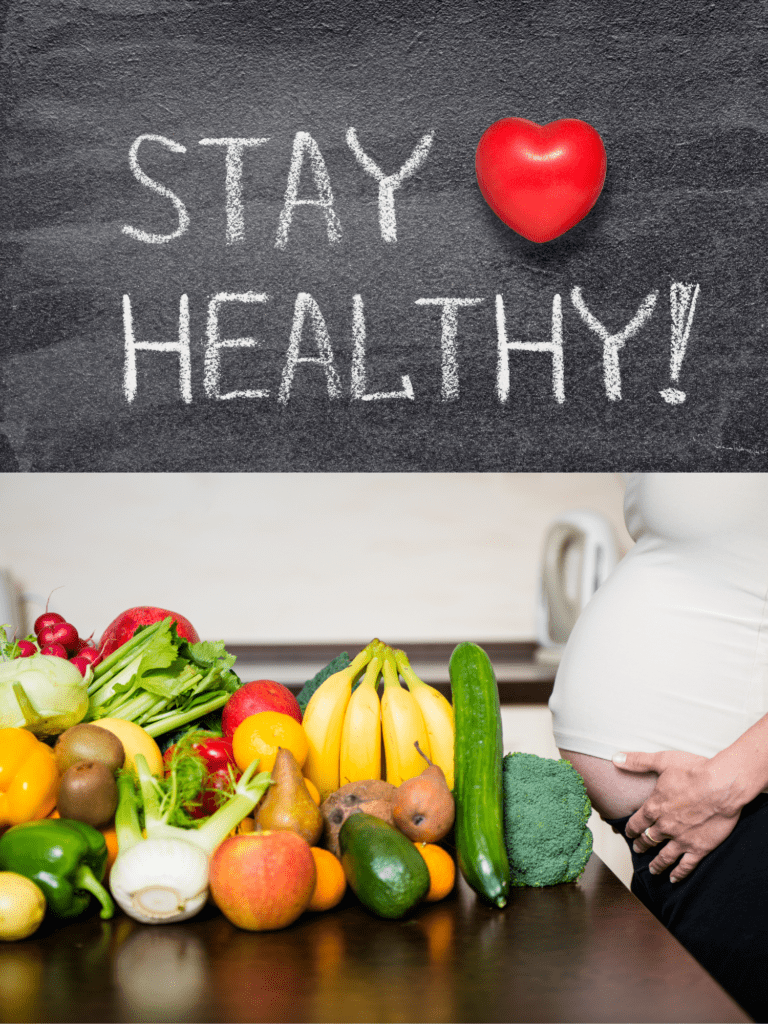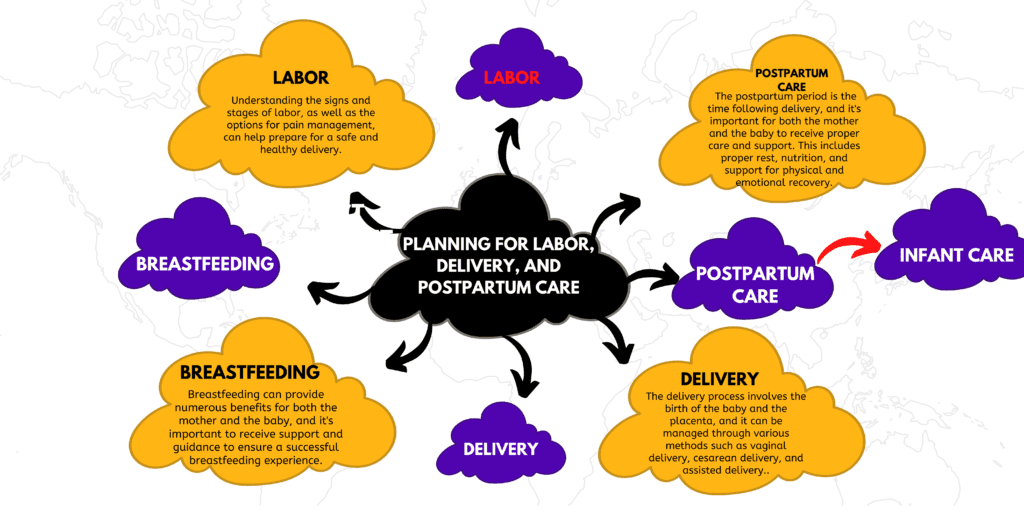Introduction of Healthy Pregnancy
Congratulations on your pregnancy! Having a baby is a wonderful experience, but it can also be overwhelming. As a soon-to-be mother, you have a lot of questions and concerns about what you can do to have a healthy pregnancy. This guide is designed to help you understand the steps you can take to ensure a safe and healthy pregnancy.
Brief overview of the importance of a healthy pregnancy
A healthy pregnancy is crucial for both the mother and the baby. During pregnancy, the mother’s body undergoes significant physical and hormonal changes that can impact her health and the health of the developing fetus. A healthy pregnancy can reduce the risk of complications during pregnancy, birth, and postpartum. As well as ensure that the baby receives the proper nutrients and care to grow and develop properly. Proper prenatal care, healthy lifestyle choices, and managing pregnancy-related concerns are essential components of a healthy pregnancy.
Explanation of what a MECE framework is and how it will be used in the article
MECE stands for Mutually Exclusive and Collectively Exhaustive, and it is a framework used in problem-solving and decision-making. In the context of this article, the MECE framework will be used to organize and structure the information presented in a clear, concise, and organized manner. Each section of the article will cover a specific aspect of a healthy pregnancy in a mutually exclusive manner, meaning that there is no overlap between sections. At the same time, the sections will be collectively exhaustive, meaning that all relevant information about a healthy pregnancy will be covered. This approach will help ensure that the information presented in the article is easy to understand and follow, making it a comprehensive guide for a healthy pregnancy.
Preparing for Healthy Pregnancy

Pre-Pregnancy Planning
Before you conceive, there are a few things you can do to prepare for a healthy pregnancy.
Start Taking Folic Acid
Folic acid is a B-vitamin that helps prevent birth defects in the baby’s brain and spine. Start taking a daily supplement of at least 400 micrograms of folic acid before you start trying to get pregnant and continue taking it until the 12th week of pregnancy. You can also get folic acid from foods such as leafy greens, fortified cereals, and bread.
Get to a Healthy Weight
Being at a healthy weight before you become pregnant is important for both you and your baby. Being overweight or underweight can increase the risk of complications during pregnancy and birth. If you are overweight, talk to your doctor about a safe and healthy weight loss plan. If you are underweight, your doctor can help you develop a plan to gain weight before pregnancy.
Quit Smoking and Limit Alcohol
Smoking and alcohol can harm both you and your baby. If you smoke, quitting before you become pregnant is the best thing you can do for your health and your baby’s health. If you can’t quit, try to limit your exposure to secondhand smoke. Drinking alcohol during pregnancy can cause birth defects, so it is best to avoid it altogether.
Get Vaccinated
Getting vaccinated against certain diseases before pregnancy can help protect both you and your baby. Talk to your doctor about what vaccines you may need and when to get them.
Fertility and conception
Understanding one’s fertility and the best time to conceive can improve the chances of a healthy pregnancy.
Pre-pregnancy checkups and tests
Pre-pregnancy checkups and tests help identify and address any underlying health issues that could impact a pregnancy.
Healthy lifestyle changes
Adopting a healthy lifestyle, including a balanced diet and regular exercise, can help prepare the body for pregnancy and promote a healthy pregnancy.
Nutrition and exercise
Proper nutrition and safe exercise routines are important for ensuring that the developing fetus receives the necessary nutrients and care to grow and develop properly.
Pre-pregnancy planning is a crucial step in the journey towards a healthy pregnancy. And helps set the foundation for a positive experience for both the mother and the baby.
Staying Healthy During Pregnancy

Maintaining a healthy pregnancy involves several key components. Including proper prenatal care, healthy lifestyle choices, and effective management of pregnancy-related concerns. Some of the ways to maintain a healthy pregnancy include:
First Trimester
The first trimester of Healthy pregnancy is a crucial time for your baby’s development. During this time, your baby’s major organs and systems are forming.
- Regular Prenatal Care: Getting regular prenatal care is important for a healthy pregnancy. Your doctor will monitor your health and your baby’s growth and development. You will also have the opportunity to ask questions and get advice on what you can do to have a healthy pregnancy.
- Healthy Eating: Eating a healthy diet is important for you and your baby. During pregnancy, your body needs more nutrients to support your growing baby. Focus on eating a variety of foods, including fruits, vegetables, whole grains, and lean protein. Avoid foods that can harm you and your baby. Such as raw or undercooked meat, fish with high levels of mercury, and certain types of cheese.
- Exercise: Exercise is important during pregnancy. It can help you stay healthy, manage stress, and prepare for labor and delivery. Talk to your doctor about what types of exercise are safe for you during pregnancy.
Second Trimester of Healthy Pregnancy
The second trimester is a time of growth and development for your baby. You may start to feel better as your body adjusts to the changes of pregnancy.
- Baby’s Development: During the second trimester, your baby’s organs, muscles, and bones continue to develop. Your baby will also start to move, and you may be able to feel their kicks and movements.
- Relaxation and Stress Management: Pregnancy can be stressful, but finding ways to relax and manage stress is important for you and your baby. Try to find time for yourself each day, whether it’s reading a book, taking a bath, or doing some gentle yoga. You can also try deep breathing exercises, meditation, or massage to help reduce stress.
- Travel During Pregnancy: Traveling during pregnancy is generally safe, but it’s important to talk to your doctor before making any plans. They can help you determine if travel is safe for you based on your individual situation. If you do travel, make sure you have a plan in case of an emergency and carry a copy of your prenatal records with you.
Third Trimester of Healthy Pregnancy
The third trimester is a time of preparation for labor and delivery. Your body is getting ready to give birth, and you may feel tired and uncomfortable.
- Prepare for Labor and Delivery: During the third trimester, it’s important to start thinking about how you want your labor and delivery to go. You can start to plan for a vaginal birth or a c-section, and talk to your doctor about any concerns you may have. You can also start to prepare for the arrival of your baby by setting up a nursery, washing and folding baby clothes, and packing your hospital bag.
- Comfort Measures for Late Pregnancy: As your due date approaches, you may start to feel more uncomfortable. There are several things you can do to help make you more comfortable, such as wearing comfortable clothing, taking warm baths, and sleeping on your side. You can also talk to your doctor about any discomfort you’re experiencing and what you can do to relieve it.
Common Pregnancy Concerns and How to Address Them
Pregnancy can bring several concerns, including physical symptoms and emotional worries. It’s important to address these concerns effectively to ensure a healthy pregnancy. Some common pregnancy concerns include:
- Morning sickness: This is a common symptom experienced by many expectant mothers. And it can be managed through diet and lifestyle changes. As well as medication under the guidance of a healthcare professional.
- Fatigue: Pregnancy can cause fatigue, and it can be managed by getting enough rest, napping when necessary. And engaging in gentle physical activity.
- Gestational diabetes: This is a type of diabetes that develops during pregnancy and can impact both the mother and the baby. It can be managed through diet, exercise, and medication under the guidance of a healthcare professional.
- Pre-eclampsia: This is a condition that can develop during pregnancy and is characterized by high blood pressure and damage to organs such as the liver and kidneys. It can be managed through proper prenatal care and, in some cases, medication under the guidance of a healthcare professional.
- Anxiety and depression: Pregnancy can bring about emotional changes and worries, and it’s important to seek help if necessary. Therapy, support groups, and medication under the guidance of a healthcare professional can help manage anxiety and depression during pregnancy.
It’s important to discuss any concerns or symptoms with a healthcare professional to receive the best possible care and advice. Addressing pregnancy concerns effectively can help ensure a healthy pregnancy and reduce the risk of complications.
Planning for Labor, Delivery, and Postpartum Care

Labor, delivery, and postpartum care are important aspects of a healthy pregnancy that can impact both the mother and the baby. Some of the key elements of these stages include:
- Labor: Understanding the signs and stages of labor, as well as the options for pain management, can help prepare for a safe and healthy delivery.
- Delivery: The delivery process involves the birth of the baby and the placenta, and it can be managed through various methods such as vaginal delivery, cesarean delivery, and assisted delivery.
- Postpartum care: The postpartum period is the time following delivery, and it’s important for both the mother and the baby to receive proper care and support. This includes proper rest, nutrition, and support for physical and emotional recovery.
- Breastfeeding: Breastfeeding can provide numerous benefits for both the mother and the baby, and it’s important to receive support and guidance to ensure a successful breastfeeding experience.
- Infant care: Infant care involves providing the necessary care and support for the baby, including proper nutrition, sleep, and stimulation.
It’s important to seek the advice and guidance of a healthcare professional. And to have a plan in place for labor, delivery, and postpartum care to ensure a safe and healthy experience for both the mother and the baby.
Conclusion of Healthy Pregnancy
Having a healthy pregnancy is important for both you and your baby. By following the steps outlined in this guide, you can increase your chances of having a safe and healthy pregnancy. Regular prenatal care, healthy eating, exercise, and stress management are all important components of a healthy pregnancy. With a little preparation and care, you can have the pregnancy you want and the healthy baby you deserve.
The key takeaways from the article on “The Ultimate Guide to a Healthy Pregnancy” are:
Pre-pregnancy planning is important for ensuring a healthy pregnancy. Maintaining a healthy pregnancy involves proper prenatal care, healthy lifestyle choices, and effective management of pregnancy-related concerns.
Common pregnancy concerns, such as morning sickness and gestational diabetes, can be effectively managed with the help of healthcare professionals.
Labor, delivery, and postpartum care are important aspects of a healthy pregnancy. And having a plan in place can help ensure a safe and healthy experience for both the mother and the baby.
The importance of a healthy pregnancy for both the mother and the baby
A healthy pregnancy is crucial for both the mother and the baby. It’s essential for expectant mothers to take the necessary steps to ensure a healthy pregnancy. As it can have a lasting impact on both the mother and the baby.
For the mother, a healthy pregnancy can reduce the risk of complications, such as pre-eclampsia, and improve overall physical and emotional well-being. A healthy pregnancy can also improve the chances of a successful delivery and a smooth postpartum recovery.
For the baby, a healthy pregnancy can improve overall health and development, and reduce the risk of health issues later in life. It can also help ensure a safe and healthy birth, and provide the best possible start in life.
By following these guidelines and seeking the advice of healthcare professionals, expectant mothers can maintain a healthy pregnancy and reduce the risk of complications.
FAQs
What should I eat during pregnancy?
During pregnancy, it’s important to eat a balanced and nutritious diet to support the growth and development of the baby. Some recommended foods to include in a healthy pregnancy diet are:
Fruits and vegetables: These provide essential vitamins, minerals, and fiber to support overall health.
Whole grains: Whole grains, such as whole-grain bread and pasta, provide energy and important nutrients, such as fiber and B vitamins.
Protein: Lean protein sources, such as poultry, fish, beans, and tofu, support the growth and development of the baby.
Dairy: Milk, yogurt, and cheese provide calcium, which is important for the development of the baby’s bones and teeth.
Folic acid: Folic acid is important for the development of the baby’s brain and spinal cord. And it can be found in leafy greens, legumes, and fortified cereals.
It’s also important to limit or avoid certain foods during pregnancy. Such as raw or undercooked meat, fish with high levels of mercury, and caffeine. It’s always best to seek the advice of a healthcare professional for personalized dietary recommendations during pregnancy.
How much exercise is safe during pregnancy?
Exercise during pregnancy is generally safe and can have many benefits for both the mother and the baby. However, the amount and type of exercise that is safe during pregnancy can vary depending on the individual’s physical condition and pregnancy.
In general, expectant mothers are encouraged to engage in moderate-intensity physical activity for at least 150 minutes per week. This can include activities such as walking, swimming, and low-impact aerobics. It’s also important to avoid high-impact activities, such as running and jumping. As well as activities with a high risk of falling, such as horseback riding and downhill skiing.
It’s also important for expectant mothers to listen to their bodies and adjust their exercise routine as needed. If any discomfort or symptoms arise, it’s best to consult with a healthcare professional to determine the best course of action.
It’s always best to consult with a healthcare professional before starting. Or continuing an exercise routine during pregnancy to ensure it is safe and appropriate for the individual’s needs.
What should I do if I experience morning sickness?
Morning sickness is a common symptom experienced by many expectant mothers during pregnancy. While it can be unpleasant, there are several steps that can be taken to manage or alleviate morning sickness:
Eat frequent, small meals: Eating smaller, more frequent meals throughout the day can help prevent low blood sugar levels. Which can trigger morning sickness.
Avoid trigger foods: Certain foods, such as spicy or fatty foods, can trigger morning sickness in some expectant mothers. Avoiding these foods or eating them in smaller quantities can help reduce symptoms.
Stay hydrated: Drinking plenty of fluids, such as water and herbal teas. Can help prevent dehydration and reduce symptoms of morning sickness.
Get plenty of rest: Getting adequate sleep and rest can help reduce stress and fatigue, which can trigger morning sickness.
Ginger: Ginger has been found to be an effective natural remedy for morning sickness. It can be consumed in teas, gummies, or other forms.
If morning sickness is severe or persistent. It’s best to consult with a healthcare professional to rule out any underlying health issues and discuss any potential treatments or medications.
How can I cope with mood changes during pregnancy?
Mood changes, such as feelings of anxiety and depression, are common during pregnancy. The hormonal and physical changes that occur during pregnancy can cause these mood swings. But there are several steps that can be taken to manage and cope with them:
Exercise: Regular physical activity, such as a brisk walk or yoga, can help boost mood and reduce stress.
Talk to someone: Talking to a trusted friend, family member, or mental health professional can help expectant mothers process their feelings and find support.
Get enough sleep: Adequate sleep is important for overall health and well-being, and it can help reduce symptoms of anxiety and depression.
Eat a healthy diet: Eating a balanced and nutritious diet can help regulate mood and energy levels.
Practice self-care: Taking time for self-care, such as a relaxing bath or a quiet activity, can help expectant mothers recharge and reduce stress.
If mood changes are severe or persistent, it’s best to consult with a healthcare professional to discuss potential treatment options, such as therapy or medication. It’s also important to reach out for help if feelings of anxiety or depression interfere with daily life.
What should I know about prenatal care?
Prenatal care is a critical component of a healthy pregnancy. As it helps ensure the well-being of both the expectant mother and the developing fetus. Here are several key aspects of prenatal care:
Regular check-ups: Expectant mothers should attend regular prenatal check-ups with a healthcare professional. Typically every 4-6 weeks during the first and second trimesters, and every 2-3 weeks during the third trimester.
Testing: Prenatal care typically involves several tests, such as blood tests, ultrasound, and prenatal screening tests, to assess the health of the expectant mother and fetus.
Nutrition and lifestyle: Expectant mothers should follow a healthy diet and lifestyle, and avoid habits such as smoking, alcohol consumption, and drug use, as they can harm the fetus.
Exercise: Regular physical activity, such as a brisk walk or yoga, is recommended for expectant mothers to maintain their physical health and well-being.
Preparing for labor and delivery: Expectant mothers should discuss the options for labor and delivery with their healthcare professional, including pain management options, and develop a birth plan.
Postpartum care: Prenatal care should also include planning for postpartum care, including discussing options for birth control and recovery from childbirth.
It’s important for expectant mothers to attend all prenatal appointments and to discuss any concerns. Or questions with their healthcare professional to ensure a healthy pregnancy and delivery.
What are the different stages of labor?
Labor is divided into three stages:
First Stage: The first stage of labor involves the dilatation of the cervix and the descent of the fetus into the birth canal. This stage is further divide into two phases: early labor and active labor.
Early labor: This phase involves mild contractions that can last from a few hours to several days.
Active labor: During this phase, contractions become stronger and more frequent. And the cervix dilates from 6 centimeters to 10 centimeters.
Second Stage: The second stage of labor begins when the cervix is fully dilate and ends with the delivery of the baby. This stage is also refer to as the pushing stage, and it typically lasts 30 minutes to 2 hours.
Third Stage: The third stage of labor begins with the delivery of the baby and ends with the delivery of the placenta. This stage typically lasts 5-30 minutes.
It’s important for expectant mothers to discuss their options for pain management during labor and delivery with their healthcare professional. And to have a plan for coping with the physical and emotional demands of labor. Regular prenatal check-ups can help ensure a healthy pregnancy and delivery.
How can I prepare for delivery?
Preparing for delivery involves both physical and emotional preparation. Here are several ways to prepare for delivery:
Prenatal education: Expectant mothers can attend childbirth education classes to learn about the stages of labor, breathing and relaxation techniques, pain management options, and postpartum care.
Create a birth plan: Expectant mothers can work with their healthcare professional to create a birth plan that outlines their preferences for labor and delivery. Such as pain management options, the use of instruments such as a epidural or vacuum. And the presence of support people.
Physical preparation: Expectant mothers can prepare for delivery by staying active through regular physical activity. Such as walking, yoga, or prenatal exercise classes, and maintaining a healthy diet.
Emotional preparation: Expectant mothers can prepare for the emotional demands of labor. And delivery by seeking support from friends and family. And discussing any concerns or questions with their healthcare professional.
Pack a hospital bag: Expectant mothers should pack a bag for the hospital that includes items. Such as comfortable clothing, toiletries, and items for their baby, such as a car seat and blanket.
By preparing for delivery, expectant mothers can feel more confident and in control during the process. And ensure a healthy delivery for both themselves and their baby.
What should I expect during postpartum care?
Postpartum care refers to the care and support provided to new mothers after delivery. Here is what to expect during postpartum care:
Physical recovery: New mothers can expect to experience physical changes and discomfort as their bodies recover from delivery. Such as vaginal bleeding, discomfort in the perineal area, and fatigue.
Emotional adjustment: New mothers may experience a range of emotions during the postpartum period. Such as feelings of joy, excitement, and love, as well as feelings of sadness, anxiety, and stress.
Monitoring the baby: New mothers should expect to have regular check-ups for themselves. And their baby to monitor their physical and emotional well-being and address any concerns or questions.
Feeding the baby: New mothers can expect to spend a significant amount of time feeding their baby. Eeither through breastfeeding or bottle feeding. They may receive support and advice from lactation consultants and healthcare professionals.
Managing household tasks: New mothers may need help with household tasks. Such as cooking, cleaning, and caring for other children, as they adjust to their new role and physical recovery.
Support: New mothers can expect to receive support from their partner, family, friends, and healthcare professionals during the postpartum period.
Postpartum care is an important aspect of a healthy pregnancy. And new mothers should feel comfortable seeking support and advice as they adjust to their new role and physical recovery.
Learn more about this topic







Hey very cool web site!! Man .. Excellent .. Amazing .. I’ll bookmark your blog and take the feeds also…I’m happy to find numerous helpful info here in the post, we need develop extra techniques in this regard, thank you for sharing. . . . . .
Almost all of the things you say happens to be supprisingly appropriate and it makes me ponder the reason why I had not looked at this in this light before. This article truly did turn the light on for me as far as this specific subject matter goes. Nonetheless at this time there is actually one position I am not necessarily too cozy with and whilst I attempt to reconcile that with the main theme of the position, allow me observe exactly what all the rest of your visitors have to say.Very well done.
You made some clear points there. I looked on the internet for the issue and found most persons will consent with your website.
Your point of view caught my eye and was very interesting. Thanks. I have a question for you.
Thanks for sharing. I read many of your blog posts, cool, your blog is very good.
Thanks for sharing. I read many of your blog posts, cool, your blog is very good.
Your article helped me a lot, is there any more related content? Thanks!
I don’t think the title of your article matches the content lol. Just kidding, mainly because I had some doubts after reading the article.
Your article helped me a lot, is there any more related content? Thanks!
Some truly interesting details you have written.Assisted me a lot, just what I was looking for : D.
Hi, Neat post. There’s a problem with your website in internet explorer, would test this… IE still is the market leader and a large portion of people will miss your great writing due to this problem.
I wish to get across my love for your generosity supporting visitors who have the need for help on the study. Your personal dedication to getting the solution throughout appeared to be exceedingly valuable and have continually made girls like me to attain their aims. Your entire warm and friendly instruction entails this much a person like me and further more to my mates. Regards; from everyone of us.
I don’t think the title of your article matches the content lol. Just kidding, mainly because I had some doubts after reading the article.
The piece was both informative and thought-provoking. Thanks for the great work!
Making hard to understand topics accessible, you’re like the translator I never knew I needed.
Really wonderful information can be found on web blog. “The only thing you take with you when you’re gone is what you leave behind.” by John Allston.
The posts are like a cozy nook, inviting and comfortable, where I can immerse myself in thoughts.
The attention to detail is remarkable, like a detective at a crime scene, but for words.
I’m extremely impressed along with your writing skills as neatly as with the format in your blog.
Is that this a paid subject matter or did you
customize it your self? Anyway stay up the nice high quality writing, it is rare to peer a great
blog like this one today.
I don’t think the title of your article matches the content lol. Just kidding, mainly because I had some doubts after reading the article.
Thank you for your sharing. I am worried that I lack creative ideas. It is your article that makes me full of hope. Thank you. But, I have a question, can you help me?
Your point of view caught my eye and was very interesting. Thanks. I have a question for you.